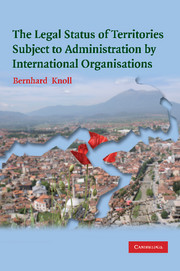Book contents
- Frontmatter
- Contents
- Illustrations
- Foreword: Pierre-Marie Dupuy
- Acknowledgements
- Table of Cases and Judicial Decisions
- List of Abbreviations
- Introduction
- 1 Creation of internationalised territories
- 2 Fiduciary administration: mandates, trust and the transitory sovereignty vacuum
- 3 Self-determination and the personality of internationalised territories
- 4 ‘The King's two bodies’: the dual functions of international administrations
- 5 Extent of UN authority in Kosovo and the problem of an open-ended institution-building mandate
- 6 The status process: Kosovo's endgame
- 7 An anomalous legitimacy cycle
- 8 Properties of a transitory legal order
- Concluding appraisal
- Bibliography
- Index
5 - Extent of UN authority in Kosovo and the problem of an open-ended institution-building mandate
Published online by Cambridge University Press: 11 August 2009
- Frontmatter
- Contents
- Illustrations
- Foreword: Pierre-Marie Dupuy
- Acknowledgements
- Table of Cases and Judicial Decisions
- List of Abbreviations
- Introduction
- 1 Creation of internationalised territories
- 2 Fiduciary administration: mandates, trust and the transitory sovereignty vacuum
- 3 Self-determination and the personality of internationalised territories
- 4 ‘The King's two bodies’: the dual functions of international administrations
- 5 Extent of UN authority in Kosovo and the problem of an open-ended institution-building mandate
- 6 The status process: Kosovo's endgame
- 7 An anomalous legitimacy cycle
- 8 Properties of a transitory legal order
- Concluding appraisal
- Bibliography
- Index
Summary
This chapter is divided into two parts. The first investigates the status of an internationalised territory in light of earlier conclusions. It places UNMIK's administration of Kosovo within the normative framework that emerged from the dynamic shift from horizontal to vertical assumption of effective control, as presented in chapter 1. Further, it contextualises the specific findings by reviewing major constitutional and policy developments in Kosovo over recent years. The second part aims to crystallise the findings of chapters 3 and 4 regarding the dual functions of an international administration and the partial personality of the territory itself, applying them to the case of Kosovo. We conclude that an international organ may indeed be torn between performing the ‘interests’ of a territory and pursuing the collective interest of the international community.
Introduction: the UN imperium over the territory
A preliminary comment regarding the particularities of Kosovo's interim international administration is in order. Since June 1999, the status of Kosovo in public international law has been the focus of heated debate among legal scholars. There has been an equally ferocious exchange of letters between UNMIK (as well as its component organisations) and the authorities of the FRY and the Republic of Serbia, who have on occasion taken issue with an alleged encroachment of the right to exercise effective control (UNMIK) or the claim to titular sovereignty (FRY).
- Type
- Chapter
- Information
- The Legal Status of Territories Subject to Administration by International Organisations , pp. 184 - 247Publisher: Cambridge University PressPrint publication year: 2008

